Related Research Articles

Robert Livingston the Elder was a Scottish-born merchant and government official in the Province of New York. He was granted a patent to 160,000 acres of land along the Hudson River, becoming the first lord of Livingston Manor.
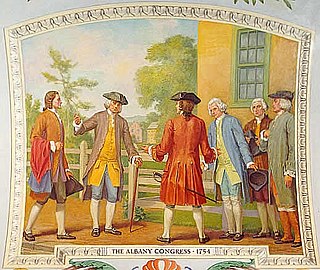
The Albany Congress, also known as the Albany Convention of 1754, was a meeting of representatives sent by the legislatures of seven of the British colonies in British America: Connecticut, Maryland, Massachusetts, New Hampshire, New York, Pennsylvania, and Rhode Island. Those not in attendance included Newfoundland, Nova Scotia, New Jersey, Virginia, Georgia, North Carolina, and South Carolina. Representatives met daily at the City Hall in Albany, New York, from June 19 to July 11, 1754, to discuss better relations with the Native American tribes and common defensive measures against the French threat from Canada in the opening stage of the French and Indian War, the North American front of the Seven Years' War between Great Britain and France.

Major-General Sir William Johnson, 1st Baronet, was a British Army officer and colonial administrator from Ireland known for his military and governance work in British colonial America.

William Livingston was an American politician and lawyer who served as the first governor of New Jersey (1776–1790) during the American Revolutionary War. As a New Jersey representative in the Continental Congress, he signed the Continental Association and the United States Constitution. He is considered one of the Founding Fathers of the United States and a Founding Father of New Jersey.

Sir Edmund Andros was an English colonial administrator in British America. He was the governor of the Dominion of New England during most of its three-year existence. At other times, Andros served as governor of the provinces of New York, East and West Jersey, Virginia, and Maryland.
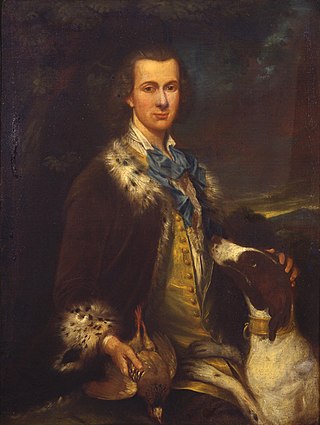
Thomas Dongan, 2nd Earl of Limerick, was a member of the Irish Parliament, Royalist military officer during the English Civil War, and Governor of the Province of New York. He is noted for having called the first representative legislature in New York, and for granting the province's Charter of Liberties. His negotiations and subsequent alliance with the Iroquois Indian Confederacy brought a lasting security from the French and their hostile Indian allies.
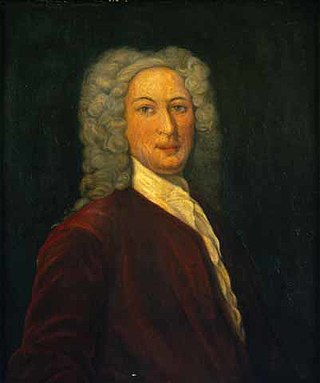
Philip Livingston was an American merchant, slave trader and politician in colonial New York. The son of Robert Livingston the Elder and elder brother of Robert of Clermont, Philip was the second lord of Livingston Manor.
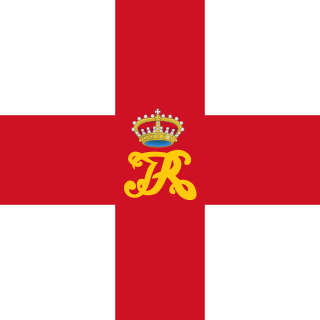
The Dominion of New England in America (1686–1689) was a short-lived administrative union of English colonies covering all of New England and the Mid-Atlantic Colonies, with the exception of the Delaware Colony and the Province of Pennsylvania. The region's political structure was one of centralized control similar to the model used by the Spanish monarchy under the Viceroyalty of New Spain. The dominion was unacceptable to most colonists because they deeply resented being stripped of their rights and having their colonial charters revoked. Governor Edmund Andros tried to make legal and structural changes, but most of these were undone and the Dominion was overthrown as soon as word was received that King James II had vacated the throne in England. One notable change was the forced introduction of the Church of England into Massachusetts, whose Puritan leaders had previously refused to allow it any foothold.
Robert Yates was an American politician, attorney, jurist, and surveyor. As a delegate representing New York at the Constitutional Convention in 1787, Yates is considered a Founding Father of the United States. Best known as a leader of the Anti-Federalist movement, he was the presumed author of political essays published in 1787-1788 under the pseudonyms "Brutus" and "Sydney". The essays opposed the Constitution based on the scope of the national government and the diminished sovereignty of the states. Yates also served as chief justice of the New York Supreme Court from 1790 to 1798.
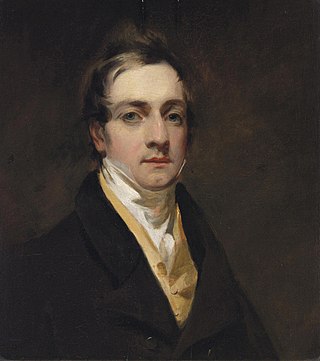
Peter Van Brugh Livingston was a Patriot during the American Revolution who was a wealthy merchant and who served as the 1st New York State Treasurer from 1776 to 1778.

The district magistrate, also known as the district collector or deputy commissioner, is a career civil servant who serves as the executive head of a district's administration in India. The specific name depends on the state or union territory. Each of these posts has distinct responsibilities, and an officer can assume all of these roles at once. The district magistrate is primarily responsible for maintaining law and order, while the district collector focuses on land revenue administration, and the deputy commissioner is in charge of overseeing developmental activities and coordinates government departments. Additionally, they also serve as election officers, registrar, marriage officer, licensing authority, and managing disaster responses, among other things. While the specific scope of duties may vary from state to state, they are generally similar. The district magistrate comes under the general supervision of divisional commissioner.

Pieter Schuyler was the first mayor of Albany, New York. A long-serving member of the executive council of the Province of New York, he acted as governor of the Province of New York on three occasions – twice for brief periods in 1709, after the death of Lord Lovelace, and also from 1719 to 1720, after Robert Hunter left office.
The Ceylon Civil Service, popularly known by its acronym CCS, was the premier civil service of the Government of Ceylon under British colonial rule and in the immediate post-independence period. Established in 1833, it functioned as part of the executive administration of the country to various degrees until Ceylon gained self-rule in 1948. Until it was abolished on 1 May 1963 it functioned as the permanent bureaucracy or secretariat of Crown employees that assisted the Government of Ceylon.
Peter Wraxall was a British official in the province of New York.

In the Commonwealth of Nations, a high commissioner is the senior diplomat, generally ranking as an ambassador, in charge of the diplomatic mission of one Commonwealth government to another. Instead of an embassy, the diplomatic mission is generally called a high commission.
The history of Albany, New York from 1664 to 1784 begins with the English takeover of New Netherland and ends with the ratification of the Treaty of Paris by the Congress of the Confederation in 1784, ending the Revolutionary War.
The 1912 Birthday Honours were appointments in the British Empire of King George V to various orders and honours to reward and highlight good works by citizens. The appointments were made to celebrate the official birthday of The King, and were published on 11 June 1912.
The 1860 Birthday Honours were appointments by Queen Victoria to various orders and honours to reward and highlight good works by citizens of the British Empire. The appointments were made to celebrate the official birthday of the Queen, and were published in The London Gazette on 18 May 1860.
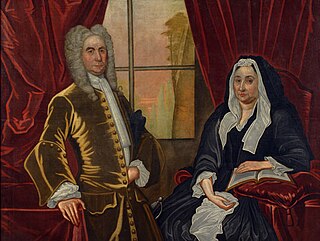
Johannes Schuyler was a prominent American of Dutch ancestry who served as the 10th Mayor of Albany, New York from 1703 to 1706, and later was a member of the provincial assembly. He was the paternal grandfather of U.S. Senator Philip Schuyler and Mayor Abraham Cuyler.
References
- 1 2 Rhoden, Nancy L. (2014). English Atlantics Revisited: Essays Honouring Ian K. Steele. McGill-Queen's Press - MQUP. pp. 240–243. ISBN 9780773560406 . Retrieved 7 September 2017.
- 1 2 Sturtevant, William C. (1988). Handbook of North American Indians: History of Indian-white relations. United States Government Printing Office. ISBN 9780160045837.
- ↑ Trelease, Allen W. (1997). Indian Affairs in Colonial New York: The Seventeenth Century. University of Nebraska Press. ISBN 080329431X.